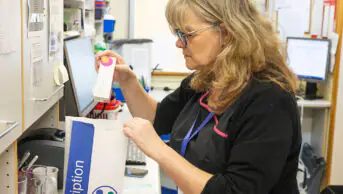
Shutterstock.com
The government has said it will be “maximising Pharmacy First approaches” to ear, nose and throat (ENT) care, as part of plans intended to cut NHS waiting lists.
The ‘Reforming elective care for patients’ plan, published by the Department of Health and Social Care and NHS England on 6 January 2025, says it will shift care from hospitals to the community and work with the private hospital sector to reduce the backlog of patients waiting for NHS treatment.
The document also outlines plans to increase the use of community diagnostic centres, expand surgical hubs and increase the number of direct referrals from GPs.
Under NHS standards, patients should have to wait no longer than 18 weeks from referral to treatment. However, as of October 2024, 6.3 million patients were waiting for an appointment, procedure or operation, with more than 40% of these waits exceeding 18 weeks.
The plan states that by March 2026, the percentage of patients waiting less than 18 weeks for elective treatment will be 65%, with that percentage rising to 92% in 2029.
In a statement published alongside the plan, the government said that more treatment for five specialties, with particular pressure on waiting lists, will also be made available outside of hospital through targeted reforms, including ENT services, “where around 30% of referrals currently made to secondary care could be provided in the community”.
“ENT is currently mainly delivered in secondary care, including tinnitus and simple ear infections, although approximately 30% of referrals can be managed earlier and in a more convenient setting,” the plan states.
“In ENT services, we will bolster the community offer by expanding non-surgical community-based ENT services, maximising Pharmacy First approaches and developing one-stop clinical models to support patients needing ear care and patients with rhinitis.”
The reforming elective care plan also highlights a case study of a community pharmacy-run hearing health programme in south west London, which saw 20 pharmacies offer digital otoscopy, earwax removal and hearing checks.
Almost 70% of patients were able to complete their treatment as part of the programme and only 3% of completed appointments resulted in a recommendation for the patient to be referred to secondary care.
The Pharmaceutical Journal reported in April 2024 that the service had been discontinued by NHS South West London Integrated Care Board owing to a lack of funding.
Commenting on the plans, Malcolm Harrison, chief executive of the Company Chemists’ Association (CCA), said: “[The CCA] absolutely support a Pharmacy-First style approach to ear, nose and throat services. Pharmacy First has proven to be a success in a short space of time, and expansion into new conditions will ensure even more patients benefit.
“If the government and NHS England are serious about shifting care into the community, as well as freeing up GP capacity, they should consider how they can help turbocharge Pharmacy First.”
Alastair Buxton, director of NHS services at Community Pharmacy England (CPE), said: “CPE has long been a proponent of building on the Pharmacy First service for the benefit of patients, the public and the wider NHS.
“Any changes to services would be subject to [‘Community pharmacy contractual framework’] negotiations, which we are ready to restart immediately. However, we have also repeatedly made clear that there can be no expansion of services without financial stabilisation of the sector.”
Gareth Jones, director of corporate affairs at the National Pharmacy Association, said: “This promise to maximise a Pharmacy First approach is positive but needs further clarification about what it might mean in practice.
“From what we know of the elective recovery plan overall, it underplays the potential of community pharmacy to help bring down waiting times by building up community-based support for prevention and hospital discharge.”
Tase Oputu, chair of the Royal Pharmaceutical Society’s English Pharmacy Board, said: “We welcome the government’s commitment to maximising Pharmacy First approaches, which highlight the important role pharmacists play in delivering care closer to home and managing demand across the health service.
“Expanding clinical services, including ear care, provides patients with greater choice and convenience. However, as pharmacists take on more responsibilities, it’s essential this is matched with appropriate investment and workforce support to ensure sustainable, high-quality care.”
In December 2024, health secretary Wes Streeting said that negotiations on the pharmacy contract are set to start “shortly in the new year”.
Data published by the CCA, in March 2024, revealed that nearly one-third of Pharmacy First consultations completed by pharmacy multiples in the first month of the service were carried out in the most deprived parts of England.
1 comment
You must be logged in to post a comment.



Funded quality face to face training should also be included in negotiating. As ear wax removal is not a service that can be learnt on a cppe online course. I was lucky to have support from my local GP practice whom offered support with the use of an otoscope in child for the otitis media for pharmacy first, without this I would not have been confident in providing this service with the current online training courses available.